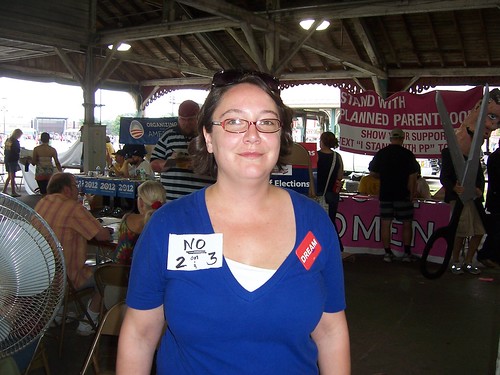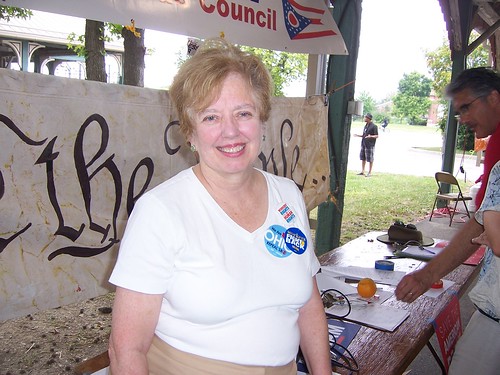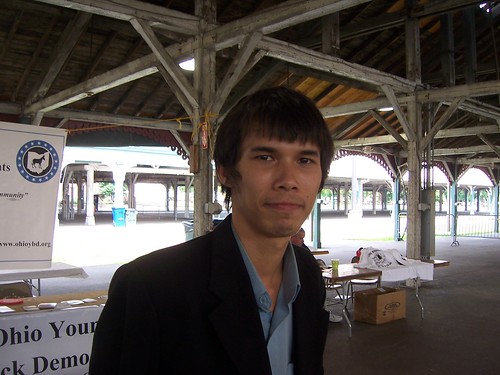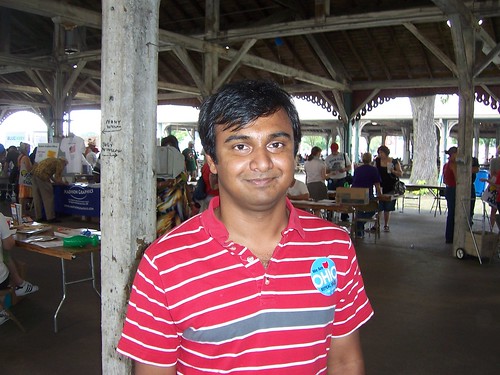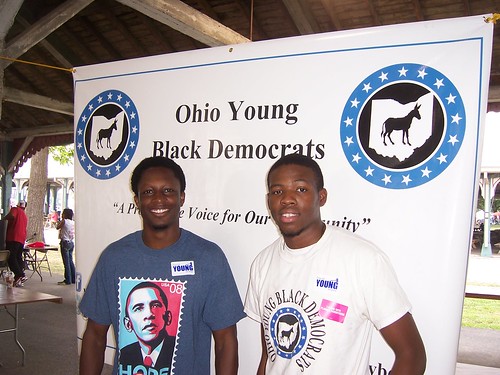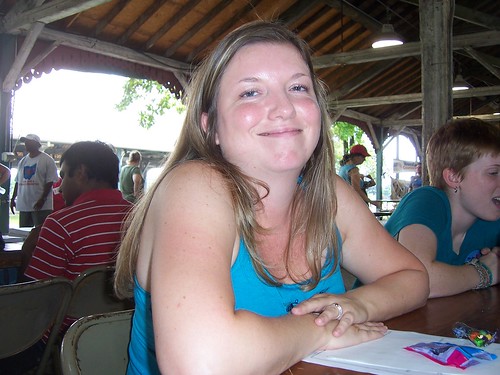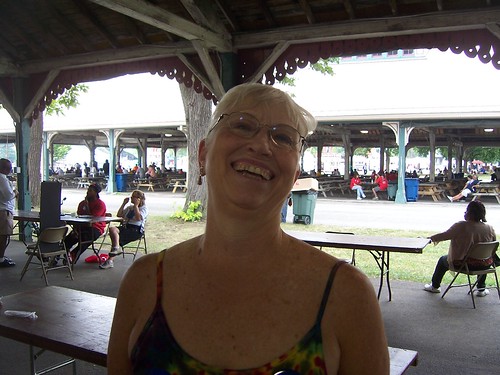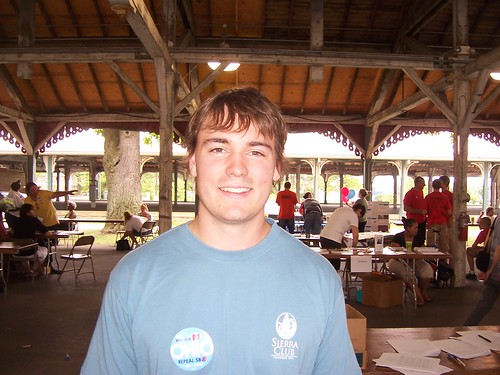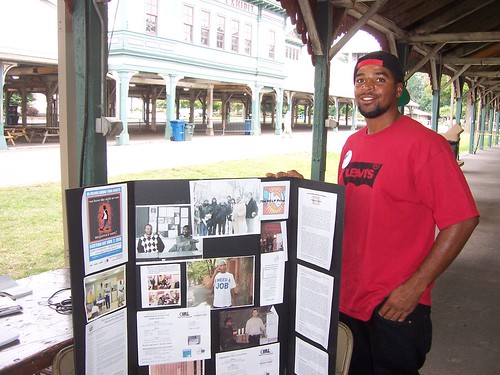Picking the brains of some of the participants of the Stand Up For Ohio festival
- Artist: Progressive Activst
- Title: Stand Up For Ohio festival
- Length: 59:44 minutes (54.68 MB)
- Format: MP3 Stereo 44kHz 128Kbps (CBR)
(Sorry, the text and photos are not in the same order as the audio content. We'll fix that as soon as possible. We're spread thin, and would welcome your collaboration w/ us. And audio from James Lunsford of The Help Project was not included, but it'll be aired next week and podcasted under Civically Engaged. Thanks, Tom Over tomover@ymail.com
Deb Steele spoke w/ us at the Stand Up For Ohio Festival on Aug 20, though this picture of her was taken in February.
A ‘disorientation guide’ for incoming OSU freshmen (and freshwomen)
She is helping Ohio State University students form a chapter of the Progressive Student Coalition.
“We just sort of need more progressive groups coming together. The Progressive Student Coalition is the feminists, the environmentalists, the worker rights student groups coming together to get more bang for our activism energy.”
Those students did an event at OSU on May 5 of this year called Live Against Five, at which they gathered about 300 signatures to add to the petition drive that put the repeal of Ohio House Bill 5 up to a vote this fall.
The OSU Progressive Student Alliance currently is working on the ‘Disorientation Guide’ to give to incoming freshman.
“It’s about the realities of the politics of the city we live in and the reality of Gordon Gee acting pretty cushy w/ corporations.”
Privatizing our land grant university ?
“There are murmurs of him wanting to privatize Ohio State University in the near future,” said Steele.
She said there is currently money going to charter universities that should be going to public universities.
“ I wouldn’t be surprised-- if we did nothing--in a year and a half you would see some kind of OSU wing that’s a charter school. I’ve heard the chief medical center lobbyist say ‘we’re revisiting our mission statement; maybe we won’t always be a land grant university.’ So, we have a whole lot of fires to put out, here and now. But the greed doesn’t end. Privatize everything!”
Making the expansion of OSU’s medical center more accountable to the community
Steele is also involved w/ efforts to get a Community Benefit Agreement w/ the university, as it expands its medical center. Project One
“ It’s the largest construction project Columbus has ever seen. It’s gong to impact the Near Eastside a lot.”
Steele said OSU is probably going to buy half of Poindexter Village. It’s a 22 acre site and one of the first public housing units ever opened in the country.
“So, this is prime real estate in an important neighborhood that has a lot of history. If we can get a community Benefit Agreement the community can grow w/ OSU.”
Steele said a CBA makes sense given that developers have received a combination of tax breaks and grants at the federal, state, and city levels, amounting to at least $300 million.
“What we want are things like a local hiring provision, a career ladder, and more assurances that people are going to be receiving family-sustaining wages and benefits.”
Expelling Sodexo from school ?
Steele is also involved w/ efforts to kick Sodexo out of Columbus Public Schools as a near-term goal, though getting them out of OSU is a longer term project. Sodexo is a food vender at the Ohio Stadium and at the Schottenstein Center/Value City Arena.
“They have a contract w/ OSU and they have a bigger contract w/ Columbus Public Schools. This summer, the Columbus Public School Board at some point--- I think they can drag it out to the fall---could renew their contract w/ Sodexo. We don’t want them to do that."
Steele said Sodexo is a known human rights violator across the world. She said both the university and the city’s public school system could dump Sodexo for US-based, if not Ohio-based companies that treat their employees better.
Voter suppression
Steele is involved w/ the petition drive that, if successful, will put the repeal of Ohio House Bill 194 on the ballot for Nov 2012, as well as prevent the bill from applying to voting this fall.
“It (HB 194) restricts the early voting window. They didn’t keep the photo ID thing in there. That’s not on the table right now, thank goodness. But if House Bill 194 stays in place, it makes voting harder. 2004 should have shown us early voting is a great thing. Even in 2008 (which had a 35 day early voting period) we had a line out the door (at the Veterans Memorial Center.) And they want to restrict voting ? The people who want to restrict voting seem to have a problem w/ democracy.”
Steele said efforts to restrict voting are taking place across the country. She said requiring all 9 digits of a person’s social security number is one way of discouraging people from voting.
“It’s identity theft. The last four digits of my social security and my autograph don’t work? It scares people out of voting…Our country runs better when people vote.”
She said voter fraud is rare and whatever cases do exist are grossly exaggerated.
Building alliances
“People across the country are connecting the dots. (They realize there is) a well-orchestrated attack on the working class. This is an attack on people voting. (It’s based on) driving the environment for profit, rather than the environment for people, in the long run. We can have jobs and a strong, healthy environment but they want to pretend it’s one or the other.”
Steele said some politicians have been presenting divisive and false choices to us on many issues.
“As far as building our coalitions and trying to fight more than one of these fires at once, I think it’s fairly natural and easy.”
It remains to be seen whether this movement will be strong enough to defeat right-wing extremism which might rule over us if the middle-class, the working class, and the poor turn on each other, focusing on issues of race, ethnicity, religion, sexuality and other things that can divide us, instead of the things that unite us.
Christine Kozobarich recently joined Ohio Communities United as a lead organizer.
She agreed that environmentalism and social justice activism should be combined in order to build a bigger movement.
“That’s a very good way to come together for people who care about progressive issues. Sometimes we get so entrenched in our own issue that we’re working on at the moment that we don’t step back and see how it’s connected to things other people are working on.”
Kozobarich said building alliances that bring together a variety of causes reflects the reality of every day life.
“As Ohioans, we all need healthcare. We all need good jobs. We all need safe, secure communities. We all need a healthy environment to live in and raise our children in…We’re not one-issue communities.”
She said events such as the Stand Up For Ohio festival are ways for people to find common cause w/ one another, instead of being divided and conquered w/ wedge issues.
We spoke w/ former US Representative Mary Jo Kilroy at the Stand Up For Ohio festival. Here is what she had to say about building alliances to counter right wing extremism.
“We have to offer ideas to people that matter to them and their lives. The biggest thing we need to be talking about is how to improve the economy and bring jobs to our cities and to our towns and rural communities, jobs that allow people to have a middle class standard of living.”
Kilroy said she doesn’t want to talk w/ people about Sarah Palin or Michele Bachmann.
“I want to talk to people about where they’re at, what matters in their lives, not the lunacy that some of these right-wing, divisive figures peddle in this country.”
Kilroy acknowledged the risk of that sort of lunacy taking over our country if voters become desperate amid hard times. But she does not focus on those right-wing personalities when she engages w/ communities.
“ I don’t want to ignore them(people such as Bachmann), I just don’t want to talk to people about them all the time. I want to talk to people about what matters to them, so they see that there are other people, other ideas out there that are going to address their real needs so that those other crazy things…don’t have currency w/ them.”
Kilroy said if people are not side-tracked by hot-button issues such as evolution or global warming, they can take a stand for fairness for the vast majority of Americans.
“They don’t have to settle for politicians that are only concerned w/ 1 percent of the country.”
Fighting for the repeal of Ohio Senate Bill 5 as well as the repeal of Ohio House Bill 194 are some of the things Kilroy has been doing since being out of office. She is also working w/Sisters on the Planet, an Oxfam America program and w/River Network
Hutchinson Persons
“ There’s a lack of theoretical background for a lot of organizations where they focus on one issue, but they don’t see the entire picture.”
Persons, who heads an OSU student chapter of the International Socialist Organization, emphasizes the broader picture.
“ We work in solidarity with every issue, but we realize that without the entire picture, we’re not going to get real change. If we can work for more theoretical backing w/ other organizations and work together that way, there would be a more efficient left coalition.”
Getting to what he regards as the heart of the matter, Persons said “working people should not be afraid to work together and call it what it is : a class war.”
The OSU chapter of the International Socialist Organization is comprised mostly of students and faculty, but is open to the public. It works w/ Jobs With Justice and labor unions here in Central Ohio, as well as immigrant rights groups and queer advocacy groups such as Equality Ohio.
To those democrats and progressives wary of being associated w/ avowed socialists, Persons said, “Socialists have been on the ground from the beginning. In every grassroots movement, you’ll find socialists. You can’t avoid us. We’re going to be there to struggle w/ people.”
Avishek Konar is as student at the Ohio State University who is working w/ the chapter of the International Socialist Organization there. He said struggles for the rights of workers and the poor in the United States link w/ similar struggles in India.
“ The basic problem or crisis that we’re facing is that of capitalism. So, that stays constant across countries. Even in India, there’s been a lot of state oppression and people have stood up. There’s been a lot of fragmented resistance going on in different parts of the country.”
Konar said many of India’s poor are resisting the takeover of their land, water, and other resources by multi-national corporations.
“These are poor people who have access to no resources…all they have is access to common property and resources like the forests, the rivers, or the land on which they live, or water.”
Konar said the Indian government is allowing this so multinational corporations can mine bauxite and aluminum.
“But the people from which the government is taking away land, they do not stand to benefit at all. If you have industry, it’s going to benefit the rich and the middle class--the middle class who are going to get professional jobs like engineers.”
Konar said the mass media in India is part of the process of overlooking the interests of poor people there.
“If you turn on a TV channel , these (middle class professionals) are the people who speak in English that you see. And that’s the way that the whole (resistance) movement is being highlighted, as if these Maoists or these people are all terrorists, and they do not want development, or they’re Luddites. That’s not the true picture.”
I asked Konar if he thought activists in the United States are more privileged than their Indian counterparts, and should therefore put our civil liberties to better use to further the cause of justice.
Konar said he has not yet been involved with activism in India. Though he didn't comment on how activists might put whatever privileges we have to better use, he did suggest commonalities between the two countries.
“ People in India who are from the cities--- like myself--- who can speak English are also very privileged. If people like me get involved in activism it’s not very likely that the state is---I’m sure if I go a long way, then the state will repress me.
"But if I am from a tribal area, a poor person …who cannot speak English, who cannot get access to the media, then I would get a much rawer deal compared to someone in the cities... It’s similar here in the USA. If you’re a US citizen and you’re arrested for civil disobedience, you get a completely different treatment from, say, if you are an immigrant who is not a citizen. I think you can make that parallel.”
As for another comparison between India and the US, Konar said socialism is more of a bad word here than it is in his home country.
Konar personally thinks thatSanhati.com is an excellent place where you will get a ton of resources to get acquainted with the ongoing struggle of the Indian people against the state of India.
From left, Humphrey Wireko and Dwayne Pickett of Ohio Young Black Democrats, which meets every third Wednesday of the month at the Ohio Democratic Party headquarters in Columbus where they organize and meet w/ elected officials.
Pickett said one of the biggest issues for his organization this year is voter suppression.
“You see it all over the right wing across the United States. They’re talking about voter fraud …but they got no evidence that it’s ever taken place.”
His group is working w/ other groups on a petition effort to repeal Ohio HB 194 which Governor John Kasich signed into law in July.
According to Ohio Daily Blog there is just a little over five weeks to collect the 231,000 valid signatures needed to qualify the repeal for the November 2012 ballot, thereby preventing HB 194 from going into effect until after that election, (if it’s not repealed.)
If the petition effort doesn’t meet that goal, Ohio HB 194 will affect people’s ability to vote this fall on matters such as the repeal of Ohio Senate Bill 5.
In addition to helping w/ the fight to repeal HB 194, Ohio Young Black Democrats is talking at college campuses to help people plan ahead so as to overcome the possible restrictions on voting.
Pickett said Ohio Young Black Democrats works on a variety of issues important to some of the most vulnerable people in society, such as children of low-income households.
“ Head Start is under attack right now. They talk about Head Start, ‘oh, this is discretionary spending.’ To them (Republicans), Head Start is pork, more fat to help democrats get reelected . But it’s not about reelection. It’s about kids---actual lives.”
Lives in historically under-served communities are also affected by food deserts, said Pickett.
Pickett describes local grocery stores as not having anything fresh. He said what wholesome food those stores have is often too expensive for many of the low-income people who shop there.
“I don’t know enough about urban farming---if it’s a reality or just a political reality, but I think we need to address the problem of food deserts …People who live in impoverished communities in America don’t have access to fresh fruits and vegetables.”
Rachel Radina is a graduate student working w/ Miami University Defend Ohio
“We’re concerned about the push to privatize our public universities in Ohio. Chancellor (Jim ) Petro put out a report last week or a plan to create charter or what they’re calling ‘enterprise universities’ now,” said Radina.
Here is what that plan would do, according to Radina.
“In exchange for less state funding, they would get less state regulations, which we know is not good for vulnerable populations such as students and workers. So they’d have the ability to increase tuition and increase class size. That means less quality education, but it’s going to cost more money. So it’s kind of like a backdoor tax on Ohio families.”
Radina said the report also calls for the ability to partner w/ corporate entities.
“That could create a situation where professors have to do research for corporate interests instead of for the public good. So, we’re concerned about all of these issues and we don’t really know what the final plan will look like. But we want to be included in the conversation. That’s why we here today to let the public know that these talks are going on behind closed doors, and that if we don’t do something about it, our universities will be private and less accessible to working families.”
Radina said legislators are going to be forming committees to change Petro’s plan and then create legislation. <<
>>>
“It’s in the process. He (Petro) has created a plan. Now it’s in legislators’ hands. Legislators will make changes and that will be sent out to be made into legislation. We’re not really sure what it will look like. At this point, we just have Petro’s plan which you can access online.”
Ohiohighered.org Once there, go to ‘Enterprise University Plan’
Pat Marida of the Ohio Sierra Club said the organization is working with other groups in opposition to hydraulic fracturing or ‘fracking’.
“They’ve been using hydraulic fracturing for obtaining natural gas for years. However, this new process is much deeper. It’s going down more than a mile. It’s going down into shale bedrock, well below the water table. They’re actually putting in much water down below our fresh water. They’re adding some of 596 chemicals we’ve found they are using.”
Marida said natural gas companies are exempt from the Clean Water Act, as well as the . Clean Air Act and the Safe Drinking Water Act. But added to those environmental issues are labor issues.
‘These natural gas companies, they’re not hiring union members. They’re hiring non-union truckers. Many trucks are used in this process to haul the water, the drilling rigs, and then haul away the toxic water. What once was fresh water is now toxic They’re able to extract about half of it from the ground. The rest is left in the ground.. The people who know about this process know that they gas companies are lying about the safety of it.”
Marida said if people are interested in getting involved, they can email Matt Trokan. His email address is matt.trokan@sierraclub.org
The pavilion at the Ohio State Fair Grounds reminded me of a small bizarre where various organizations had their booths and tables. Marida said there is a common cause that could ally the groups.
“It’s the takeover of America by large monetary interests, corporate interests. We think it’s the takeover also by a few greedy political interests that are working in concert w/ multinational corporations. They want to pollute. They don’t want to hire union people and they don’t want the democratic process to work.”
Marida said social justice and environmental groups should work together to further build a movement to oppose and defeat the corporate takeover of our political process.
Columbus will be part of an international event called Bike to the Future, http://biketothefuture.org/ . The ride involves a festival at Franklin Park from noon to 4 on Sept 24.
“Please come out and celebrate w/ us and recognize the importance of this issue,” said Ben Wickizer who works w/ the Ohio chapter of the Sierra Club.
And on Sept 12, the film Contested Streets will be shown at 7:30 at the South Campus Gateway, followed by a discussion led by local transportation experts.
“Transportation choice is what we’d like to see more of in this state. We’d like to see municipalities and the state in general adopt Compete Streets policies.” http://www.completestreets.org/
Wickizer agreed environmental and social justice issues are linked.
“We’re seeing attacks on and plundering of our environment, while we’re also seeing attacks on organized labor and the basic needs of individuals in the middle class and working class…So it’s great we can come together and unite and work together on some of these issues.”
James Lunsford works with The Help Project.
“Basically, what we do is we try to help guys who have a criminal background record find relevant employment. So, whether that’s helping them w/ their driving situation or getting some of their cases expunged, we try to do those certain things that help them make it to that job.”
Lunsford said The Help Project is involved in advocacy, in addition to offering services.
“On a lot of these different issues and policies you got going on in Ohio or wherever it may be, we attack those issues.”
The Help Project partners w/ the Amos Project, the Ohio Justice and Policy Center, and other organizations
- Login to post comments


